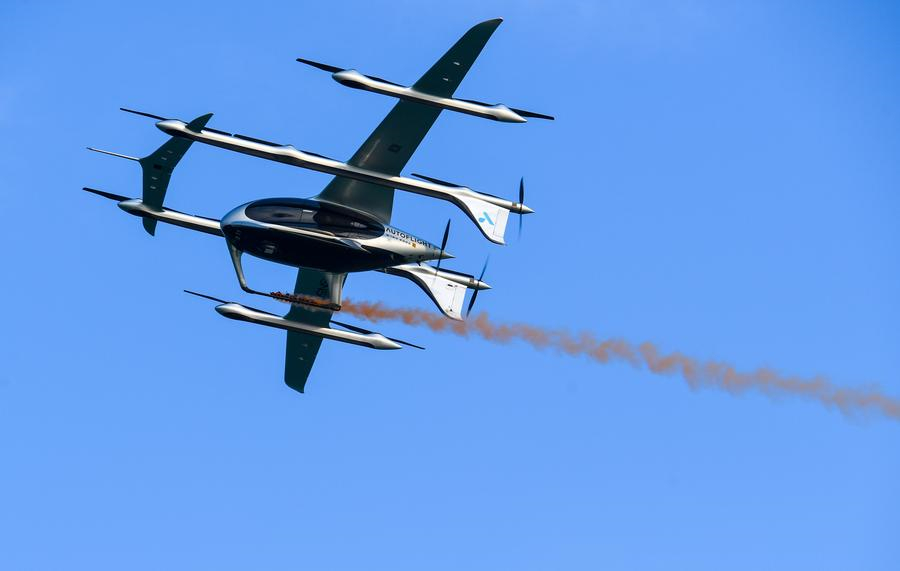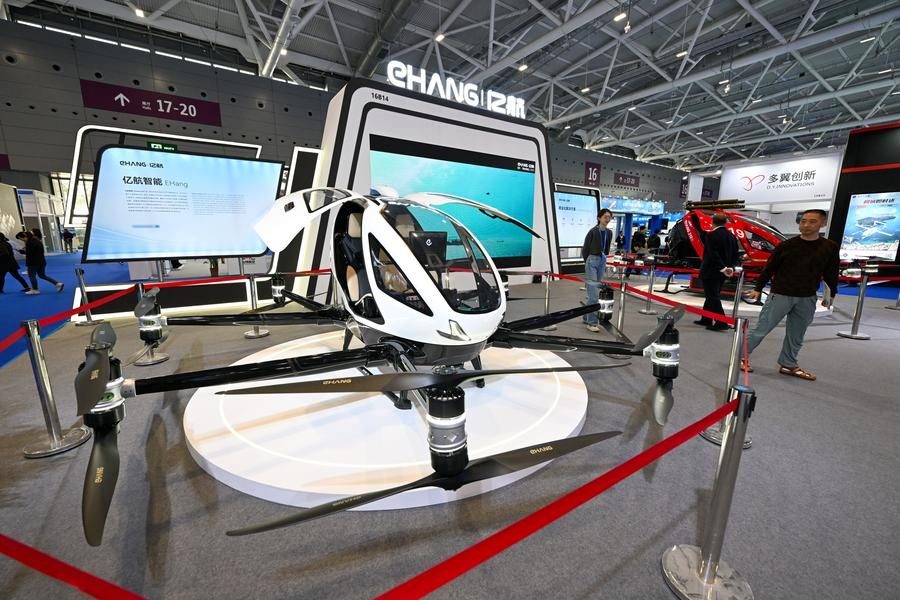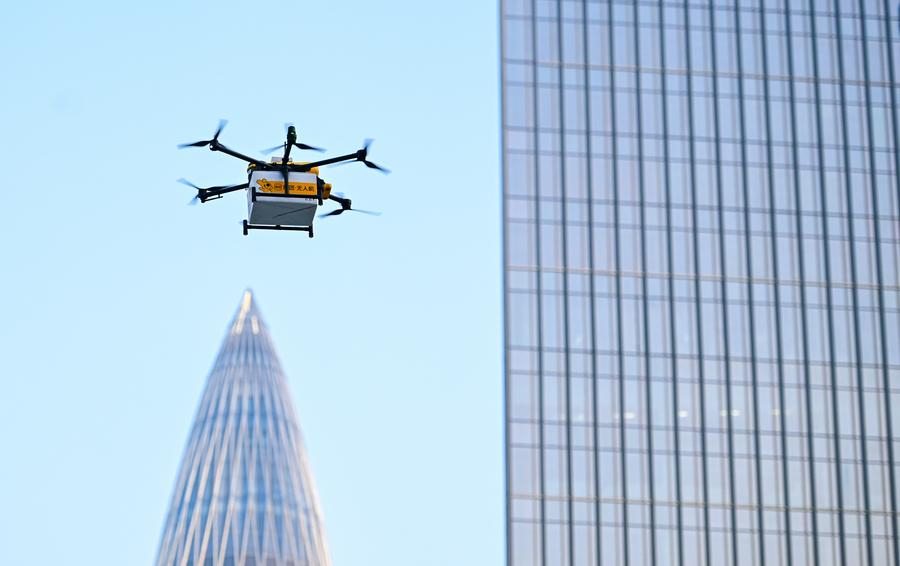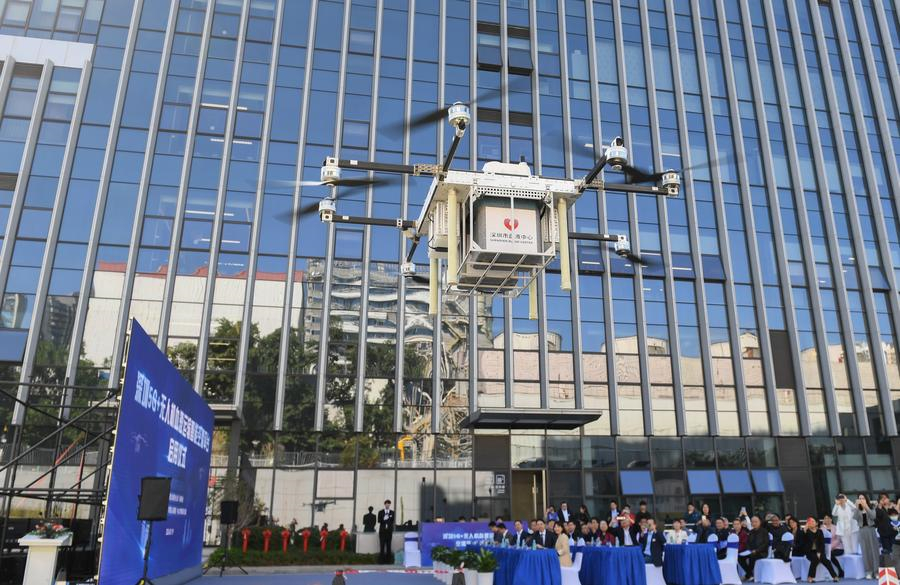China eyes buzzing low-altitude skies for new growth engine
* The low-altitude economy was defined as a strategic emerging industry at the country's annual central economic work conference in 2023 and written into this year's government work report as a new growth engine.
* An increasing number of flying taxis are spotted buzzing above Chinese cities as they step up efforts to commercialize the emerging aviation tech.
* China owns a huge market and dense city clusters. The size of China's low-altitude economy by 2023 is estimated at more than 500 billion yuan, with its scale expected to rise to 2 trillion yuan by 2030, according to the CAAC.
BEIJING -- On a sunny February afternoon, a five-seater rotor-wing aircraft took off vertically from a pier-turned-helipad in the southern Chinese city of Shenzhen.
Rising to a certain altitude, the electrically powered plane converted to fixed-wing mode and cruised above the water. The aircraft, Prosperity, which carried dummies and simulated a family trip, flew autonomously 50 km across the Pearl River Bay.
About 20 minutes later, the flying taxi landed at a ferry port in the nearby city of Zhuhai, a journey requiring more than two hours by car.
The flight marked the world's first public demonstration of an electric vertical take-off and landing (eVTOL) aircraft on a cross-sea and inter-city route, according to AutoFlight, a Shanghai-based eVTOL startup that developed the aircraft.

A 5-seat electric vertical take-off and landing (eVTOL) aircraft flies during a demonstration flight near Shekou Cruise Home port in Shenzhen, south China's Guangdong Province, Feb. 27, 2024. [Xinhua/Mao Siqian]
VERTICAL MOBILITY
An increasing number of flying taxis like Prosperity are spotted buzzing above Chinese cities as they step up efforts to commercialize the emerging aviation tech.
Compared with traditional VTOLs like helicopters, eVTOLs are generally smaller, require less space for take-off and landing, and generate less noise and pollution. Thus, they offer a promising air traffic and sightseeing option for China's congested big cities.
Earlier this month, an AeroHT Voyager X2 developed by EV start-up Xpeng completed the first eVTOL flight in the bustling central business district of Guangzhou, capital of Guangdong Province.
Last December, the autopilot aircraft coded EH216-S conducted maiden commercial flight in an airport-turned-urban park in the eastern Chinese city of Hefei, carrying human passengers.
The plane, manufactured by Guangzhou-based EHang Intelligent Technology, received its airworthiness certificate from the Civil Aviation Administration of China (CAAC) last year. After being fully charged within two hours, it can fly 30 km with a payload of up to 220 kg.
Now, short-distance flights are open to the public at the park. The local authorities in Hefei are also working to greenlight flight-seeing services at the city's Swan Lake scenic spot.
The use and maintenance of eVTOL aircraft are cheaper than those of helicopters. With the flight put into commercial operation in the future, the airfare for a one-way passenger could be reduced to 200 to 300 yuan (about 28 to 41 U.S. dollars), according to AutoFlight's preliminary cost estimate.
"The eVTOLs are propelled by pure electricity, and they operate without pilots, which means zero emissions, low noise, and low manufacturing and operating costs -- about 15 percent of those of helicopters," said Yue Qiang, a sales manager of Vertaxi, another Shanghai-based eVTOL startup.

Visitors look at an aerial vehicle of EHang during the 25th China Hi-Tech Fair (CHTF) in Shenzhen, south China's Guangdong Province, Nov. 15, 2023. [Xinhua/Mao Siqian]
EMERGING INDUSTRY
The low-altitude economy was defined as a strategic emerging industry at the country's annual central economic work conference in 2023 and written into this year's government work report as a new growth engine.
Han Jun, deputy head of the CAAC, said the low-altitude economy has a long industrial chain and wide applications in the industrial, agricultural, and service sectors.
According to CAAC data, there were 689 general aviation firms in China as of the end of 2023, with 3,173 general aviation aircraft registered and 451 general aviation airports established.
"The low-altitude airspace is a no-man's land with huge growth potential that could nurture a trillion-yuan new industry," said Shen Xiangyang, founding director of the International Digital Economy Academy in the Guangdong-Hong Kong-Macao Greater Bay Area.
China owns a huge market and dense city clusters. The size of China's low-altitude economy by 2023 is estimated at more than 500 billion yuan, with its scale expected to rise to 2 trillion yuan by 2030, according to the CAAC.
A Porsche Consulting report last year has shown that China is expected to account for about 25 to 30 percent of the global eVTOL market in 2030.
Vertical mobility, a new-quality productive force in transportation, is building up in China thanks to multiple advantages. The homegrown C919 jetliner provided the local aviation chains with more knowledge about aircraft engineering, safety, and airworthiness. The Beidou navigation and 5G network revolutionized management in low-altitude airspace.
Plus, China's technical capacity accumulated in the hardware and telecom sectors has laid a foundation for the industry's fast growth. The country's prosperous electric vehicle manufacturing brought about rich know-how in high-density batteries, high-reliability motors, electronic control, and autonomous driving.
Farasis Energy, a Chinese battery cell manufacturer, has delivered ternary lithium soft-pack batteries for electric airplane makers. The power batteries have a maximum cruising range of 250 km in a single trip and can realize more than 10,000 cycles.
At Auto Shanghai 2023, the battery giant Contemporary Amperex Technology Co., Ltd. (CATL) displayed a high-density condensed matter battery and revealed its plan to develop manned electric aircraft jointly with collaborators.
Chengdu-based Aerofugia Tech, a subsidiary of China's EV giant Geely Auto, has received its first purchase order of 100 eVTOLs from Sino Jet, a Chinese business aviation management firm. In February, U.S. Aviation Week listed the flying car maker among the top 10 eVTOL developers in the world.
Vertaxi's 5-seater eVTOL Matrix 1, with a maximum load of 500 kg, completed its maiden flight in Shanghai last year. According to Vertaxi's CEO Xie Ling, the supply of all three core components -- electric system, flight control system, and composite material -- has been localized.

An unmanned food delivery drone is pictured in Shenzhen, south China's Guangdong Province, Nov. 24, 2023. [Xinhua/Mao Siqian]
DRONE LOGISTICS
A restaurant in the eastern Chinese city of Wuhu tested the water of a new business model on this year's Lunar New Year's Eve, which fell on Feb. 9.
Restaurant manager Luo Leilei placed orders for vegetables and meat via an express delivery platform developed by United Aircraft, a Shenzhen-based "little giant" firm specializing in the production of unmanned aerial vehicles (UAVs).
Within half an hour, a multi-rotor drone carrying the food supply descended on the open space in front of the restaurant. The drone can carry a maximum of 10 kg cargo, and fly more than 50 minutes with a 5 kg load.
At a blood station in suburban Shenzhen, drones took flight occasionally, transporting bags of blood to the city's healthcare facilities to quickly satisfy their first-aid demand.
Those drones, developed by Phoenix-Wings, a cargo drone maker owned by China's leading courier enterprise SF Express, have completed over 2,000 orders since the launch of unmanned aerial delivery in March last year.

A drone carrying blood takes off for the Shenzhen Traditional Chinese Medicine Hospital from the Shenzhen Blood Center in Shenzhen, south China's Guangdong Province, Jan. 19, 2024. [Xinhua/Mao Siqian]
Shenzhen is set to build more than 600 takeoff and landing platforms for low-flying aircraft and open over 220 inner-city UAV routes by 2025.
By the end of 2023, China had roughly 2,000 UAVs design or manufacturing enterprises and over 1.2 million registered UAVs. According to the CAAC, these drones flew more than 23 million hours last year, up by 11.8 percent compared with 2022.
According to the National Bureau of Statistics, the manufacturing of intelligent UAVs grew by 18.2 percent from January to February this year.
As unmanned technology and network scale dramatically bring down costs, drones could account for one-third of same-day package deliveries by 2040, suggests a report from L.E.K Consulting.
Han said the CAAC seeks to simplify application and approval procedures for low-altitude flight plans.
The aviation authorities in southwest China's Sichuan Province have streamlined the drone trial flight procedure. Previously, drone enterprises were required to apply for approval seven working days in advance. Now, they can be greenlighted with notifications one hour before takeoff.
Since Sichuan kicked off a low-altitude pilot project at the end of 2018, more than 630,000 safe flights with roughly 180,000 hours have been recorded in an airspace extending to 7,800 square km across the province.
Han said the CAAC will also support enterprises in carrying out drone logistics distribution pilot projects in provinces including Jiangxi, Guangdong, Shaanxi, and Sichuan.
"Following the economic booms in real estate, home appliances, online business, and new energy vehicles, one of the most promising industries in China with a market size big enough to support sustained growth in the coming years goes to the low-altitude aviation," said Li Jian, a former deputy head of the CAAC.
Reporting by Zhou Zhou, Yao Yuan, Mao Siqian, Xie Jiao, Ma Shurui, Wang He, Ma Xiaocheng, Huo Jiamian; video reporters: Li Sijia, Mao Siqian, Zhao Ziyu, Li Fuyu; video editors: Zhang Yueyuan, Mu Xuyao, Zheng Xin, Lin Lin, Hong Ling.
























